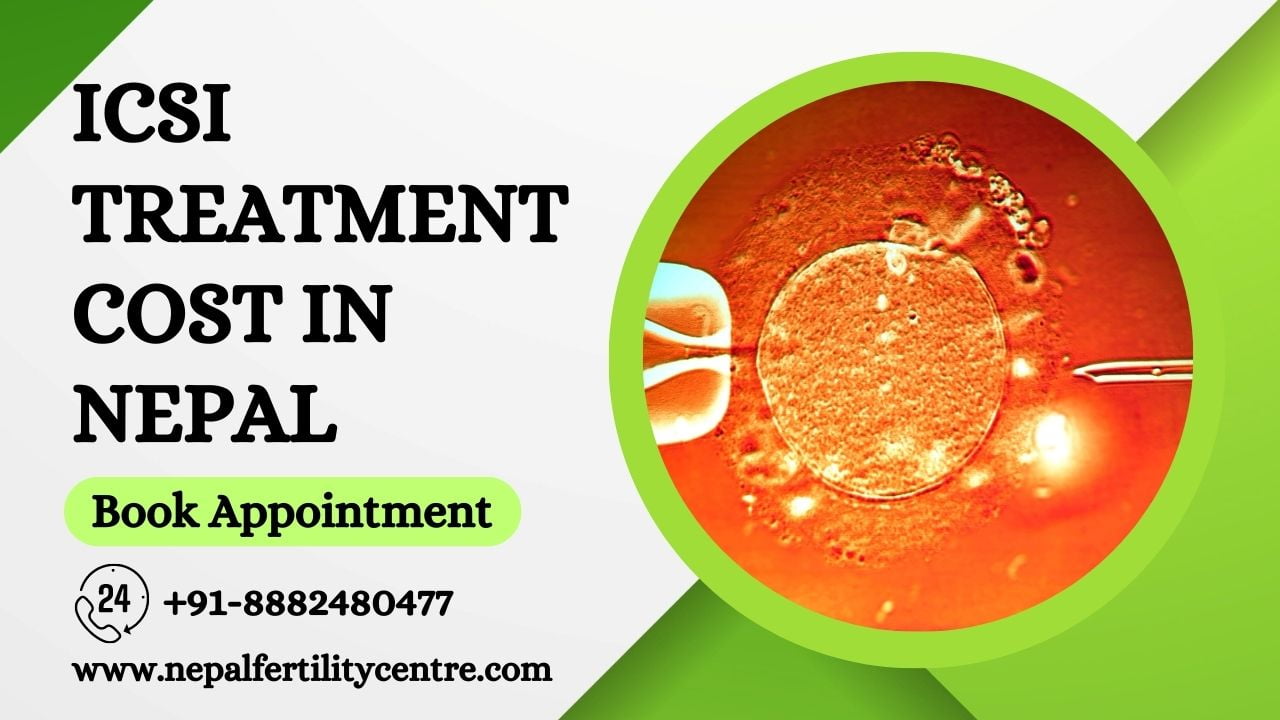(ICSI treatment cost in Nepal 2023): ‘Unleash the curtains of ICSI treatment in Nepal’
The advancement in techniques and medical science has made everything humanly possible. From reaching the moon to producing a scientific baby, now we can keep our hands on anything that was practically impossible years ago.
Infertility or not being able to experience parenthood was something people were missing for years, but gladly now we can keep a pace on that as well.
More than genetic problems, infertility has grown to 12-15% in the last few years, and the credit for that goes to our environment, lifestyle, living standards, and habits. But, in the end, anything that matters is whether you can be able to relish parenthood or not.
The ART (Assisted reproductive technology) methodology has made it possible with different techniques like ICSI, IUI, IVF, and so more.
Before jumping on to the ICSI treatment cost in Nepal, let’s probe on- What is ICSI? And how it is helpful for infertility treatment.

Understanding ICSI Treatment
Intracytoplasmic Sperm Injection (ICSI) is an advanced assisted reproductive technique offered at the Nepal Fertility Centre, specifically designed to address male infertility issues. It has revolutionized the field of fertility treatment, offering hope to couples who previously faced limited options to achieve conception.
- The Science Behind ICSI: ICSI involves a precise and intricate procedure where a single healthy sperm is selected and directly injected into the center of the mature egg using a fine microneedle. This highly specialized technique ensures fertilization even in cases of severe male factor infertility, where conventional IVF might not be successful. By facilitating direct sperm-egg interaction, ICSI maximizes the chances of fertilization and subsequent embryo development.
- Ideal Candidates for ICSI: ICSI is especially helpful for couples encountering male barrenness issues, for example, low sperm count, unfortunate sperm motility, or strange sperm morphology. It is likewise suggested for couples who have had past fruitless IVF endeavors, situations where sperm is acquired precisely, or in cases of unexplained infertility.
ICSI- A victorious win for Sperm Fertility and motility.
Intra-Cytoplasmic Sperm Injection (ICSI) has emerged as a ground-breaking option for couples struggling with male infertility in the field of assisted reproductive technologies (ART). ICSI has given hope and happiness to a lot of families all over the world thanks to its remarkable success rates and ability to address issues with sperm motility and fertility.
ICSI – Revolutionizing Fertility Treatment
As a ground-breaking innovation in the field of fertility treatment, ICSI debuted for the first time in 1992. It is a particular type of in-vitro preparation (IVF) intended to beat serious male fruitlessness issues, including low sperm count, unfortunate sperm motility, and unusual sperm morphology. In regular IVF, sperm and eggs are consolidated in a petri dish, depending on the sperm’s capacity to enter the egg normally. Be that as it may, in situations where male fruitlessness is a critical variable, this approach may not find success.
Using a tiny needle, a single, healthy sperm is precisely injected into an egg’s cytoplasm during the ICSI procedure. This cycle sidesteps the regular boundaries that frustrate treatment in traditional IVF and significantly upgrades the possibilities of effective preparation. When preparation happens, the subsequent undeveloped organism is then moved to the lady’s uterus for implantation and further development.
ICSI: A Game Changer for Sperm Fertility and Motility Challenges
ICSI has been a game-changer for couples facing male infertility challenges. Here’s how it addresses sperm fertility and motility issues:
- Overcoming Low Sperm Count: Overcoming Low Sperm Count: For couples dealing with male partners who have a low sperm count, ICSI offers a ray of hope. Since only a single sperm is required for each egg, the limited availability of viable sperm becomes less of a concern. This allows men with severe oligozoospermia (low sperm count) to have a better chance of fathering a child.
- Enhancing Poor Sperm Motility: Sperm motility, or the ability of sperm to swim and reach the egg, is vital for successful fertilization. ICSI is highly effective in cases where male partners have poor sperm motility or asthenozoospermia. By manually selecting and injecting a motile sperm into the egg, ICSI overcomes this particular obstacle and increases the likelihood of successful fertilization.
- Addressing Abnormal Sperm Morphology: Unusual sperm morphology, known as teratozoospermia, alludes to sperm with strange shapes that might prevent their capacity to prepare an egg. ICSI permits embryologists to straightforwardly pick a sperm with typical morphology, bypassing the impact of sperm abnormalities and significantly improving the chances of successful fertilization.
ICSI Success Rates
ICSI has collected great achievement rates throughout the long term, making it a sought-after fruitfulness treatment for couples confronting male barrenness issues. The outcome of ICSI generally relies upon a few elements, including the fertility center’s skill, the general well-being of the couple, the age of the female accomplice, and the nature of the sperm and eggs utilized.
While success rates can fluctuate between various centers and individual cases, studies have demonstrated the way that ICSI can bring about treatment rates as high as 70-85%, with pregnancy rates going from 40-half per cycle. These reassuring figures have imparted trust in couples who recently felt unsettled by their barrenness challenges.

ICSI- Intracytoplasmic Sperm Injection
Intracytoplasmic Sperm Infusion (ICSI) is a high level helped regenerative innovation (Craftsmanship) used to treat male barrenness or improve the possibilities of preparation in specific instances of female fertility. Created in the mid 1990 s, ICSI includes the immediate infusion of a solitary sperm into the cytoplasm of an egg to accomplish preparation. This strategy is generally utilized related to in-vitro treatment (IVF) to help couples attempting to imagine.
How ICSI Works
ICSI is typically performed following these steps:
- Ovarian Stimulation: The female partner undergoes controlled ovarian stimulation using fertility medications to encourage the development of multiple mature eggs.
- Egg Retrieval: Once the eggs have reached the desired size, they are retrieved from the ovaries through a minor surgical procedure called transvaginal ultrasound-guided aspiration.
- Sperm Collection: On the day of egg retrieval, a semen sample is collected from the male partner or a sperm donor.
- Sperm Selection: A highly skilled embryologist selects the best-quality sperm from the collected sample for injection.
- Sperm Injection: Using a specialized micromanipulation technique, a single sperm is carefully injected into the cytoplasm of an individual egg.
- Fertilization and Embryo Development: After the sperm injection, the fertilized eggs are monitored in the laboratory for signs of successful fertilization and early embryo development.
- Embryo Transfer: After a few days of development, one or more healthy embryos are transferred into the woman’s uterus, aiming for implantation and successful pregnancy.
Indications for ICSI:
ICSI is particularly useful in the following scenarios:
- Severe Male Infertility: ICSI is highly effective for couples with male infertility problems, such as low sperm count, poor sperm motility, or abnormal sperm morphology.
- Previous IVF Failures: When conventional IVF attempts have failed to achieve fertilization, ICSI can offer a higher chance of successful fertilization.
- Sperm Retrieval Challenges: In cases where sperm cannot be obtained through ejaculation due to medical reasons, surgical sperm retrieval techniques (PESA, TESA, TESE) can be used in conjunction with ICSI.
- Fertility Preservation: ICSI can be utilized to fertilize eggs retrieved through techniques like oocyte cryopreservation (egg freezing) for fertility preservation purposes.
Success Rates of ICSI:
The success of ICSI depends on various factors, including the woman’s age, the quality of eggs and sperm, the expertise of the medical team, and the overall health of the couple. Generally, the success rates of ICSI are comparable to those of conventional IVF, with approximately 30-40% of cycles resulting in a live birth. However, individual success rates may vary significantly.
Risks and Considerations:
While ICSI has revolutionized fertility treatment for many couples, it is essential to be aware of the potential risks and ethical considerations associated with the procedure:
- Genetic Concerns: ICSI can carry a slightly higher risk of passing genetic abnormalities from the father to the offspring, particularly if the male partner has genetic issues.
- Multiple Pregnancies: Transferring multiple embryos to increase the chances of success can lead to multiple pregnancies, which carry higher health risks for both the mother and the babies.
- Ethical Concerns: Some individuals and groups have raised ethical concerns about the potential long-term effects of ART on the offspring and society as a whole.
In Additions, Intracytoplasmic Sperm Infusion (ICSI) has been a pivotal headway in the field of richness medicines, offering desire to couples confronting male fruitlessness or attempting to consider through customary IVF. As clinical innovation and aptitude keep on progressing, ICSI stays a fundamental apparatus in assisting many couples with accomplishing their fantasy of being a parent. However, before undergoing ICSI treatment, it is essential for couples to seek advice from fertility specialists, fully comprehend the procedure, and consider the potential risks and ethical considerations.
Procedure for ICSI Treatment-
The ICSI treatment is a high-tech procedure, and thus before jumping to conclusions, the patients must have a brief idea about the process. Below we have mentioned the whole procedure of ICSI treatment.
Step-By-Step procedure of ICSI

The ICSI (Intracytoplasmic Sperm Injection) treatment process is a highly specialized form of in vitro fertilization (IVF) designed to address male infertility factors. It is a groundbreaking technique that offers new hope to couples struggling to conceive due to issues with sperm quality or quantity. The ICSI treatment process involves several carefully orchestrated stages, each of which plays a crucial role in increasing the chances of successful fertilization and embryo development. Let’s explore the steps involved in the ICSI treatment process at Nepal Fertility Centre:
- Initial Consultation and Evaluation: The first step is a consultation with Nepal Fertility Centre’s fertility specialists. This consultation examines both partners’ medical histories and identifies any underlying fertility issues. The couple’s clinical records and past fruitfulness evaluations, if any, are likewise checked on to make a customized treatment plan custom-made to their special necessities.
- Ovarian Stimulation: Following the assessment, the female accomplice goes through ovarian excitement to advance the improvement of different mature eggs. Hormonal drugs are directed to invigorate the ovaries, observed intently by the clinical group through ultrasounds and chemical level evaluations.
- Egg Retrieval: Once the eggs reach optimal maturity, a minor surgical procedure known as egg retrieval is performed. Under sedation, the fertility specialist retrieves the mature eggs from the ovaries using a thin needle guided by ultrasound imaging. The retrieved eggs are then taken to the laboratory for further processing.
- Sperm Collection and Preparation: On the day of egg retrieval, the male partner provides a semen sample. If needed, sperm can also be obtained through other methods, such as testicular sperm extraction (TESE) or epididymal sperm aspiration (TESA). The retrieved sperm sample undergoes a specialized preparation process to isolate motile and healthy sperm for the ICSI procedure.
- ICSI Procedure: The most critical stage of the ICSI treatment process is the actual microinjection of sperm into the egg. Using a fine glass needle, a single sperm is carefully injected into the cytoplasm of a mature egg. This process is carried out under a high-powered microscope by skilled embryologists to ensure precision and accuracy.
- Embryo Culture and Development: Following the ICSI procedure, the fertilized eggs (embryos) are cultured in a controlled laboratory environment. Over the next few days, the embryos are carefully monitored for growth and development.
- Embryo Transfer: Typically, after three to five days of embryo culture, the healthiest and most viable embryos are selected for transfer. The embryo transfer is a relatively simple and painless procedure where the selected embryos are gently placed into the woman’s uterus using a thin catheter.
- Pregnancy Test and Follow-up: Approximately two weeks after the incipient organism move, a pregnancy test is performed to decide whether the treatment was fruitful. In the event that the test is positive, the clinical group at Nepal Fertility Center will offer proceeded with help and checking all through the pregnancy journey.
At Nepal Fertility Centre, the ICSI treatment process is distinguished by meticulous attention to detail, cutting-edge laboratory facilities, and the experience of seasoned fertility specialists and embryologists. Each step is intended to streamline the possibilities of fruitful treatment and pregnancy, giving recharged trust and happiness to couples trying to satisfy their fantasies of being a parent.

ICSI- Split into two treatments
An advanced method of assisted reproduction known as ICSI, or Intracytoplasmic Sperm Injection, is used to treat male infertility or improve fertilization in some cases of female infertility. It includes the immediate infusion of a solitary sperm into the cytoplasm of an egg to accomplish treatment. We should part ICSI into two fundamental medicines for a more thorough comprehension:
Male Infertility Treatment
ICSI is particularly effective in addressing male infertility issues, including:
- Low Sperm Count (Oligospermia): When a man’s semen contains a lower than normal number of sperm, making it difficult for natural fertilization to occur.
- Poor Sperm Motility (Asthenospermia): When sperm have reduced motility or difficulty swimming towards the egg, hindering their ability to fertilize it.
- Abnormal Sperm Morphology (Teratospermia): When a significant proportion of sperm have abnormal shapes, reducing their chances of penetrating the egg.
- Retrograde Ejaculation: In some medical conditions, semen may flow backward into the bladder instead of being ejaculated normally. In such cases, sperm retrieval techniques may be used in conjunction with ICSI.
- Ejaculatory Dysfunction: Men with certain medical conditions or injuries may have difficulty ejaculating, necessitating the collection of sperm through other means like surgical sperm retrieval.
Conventional IVF Failure:
ICSI is commonly used when conventional IVF attempts have failed to achieve fertilization. In conventional IVF, eggs and sperm are mixed in a culture dish, and fertilization occurs naturally as sperm penetrate the eggs. However, if fertilization doesn’t occur, ICSI can be employed as an alternative to improve the chances of successful fertilization.
Procedure and Success Rates
ICSI includes a few stages, including ovarian excitement, egg recovery, sperm assortment, sperm determination, sperm infusion into the eggs, incipient organism improvement, and incipient organism move. The achievement paces of ICSI rely upon different variables, like the lady’s age, egg and sperm quality, and the expertise of the medical team.
Overall, ICSI achievement rates are equivalent to those of traditional IVF, with roughly 30-40% of cycles bringing about a live birth. For couples with male barrenness issues, ICSI altogether works on the possibilities accomplishing effective treatment and resulting pregnancy.
What is the Cost of ICSI treatment in Nepal?

Several factors influence the cost of ICSI treatment in Nepal, making it essential for couples to consider these aspects before seeking fertility treatment.
- Medical Facility: The reputation, experience, and success rates of the fertility clinic or medical facility will significantly impact the cost of ICSI treatment. Well-established clinics with high success rates may have higher fees compared to smaller or less renowned centers.
- Medical Team Expertise: The qualifications and expertise of the medical team, including fertility specialists, embryologists, and support staff, can influence the treatment cost.
- Diagnostic Tests: Before proceeding with ICSI, a series of diagnostic tests and evaluations are necessary to determine the best treatment plan. The costs associated with these tests may vary from one clinic to another.
- Medications: The cost of fertility medications required for ovarian stimulation and hormonal regulation is a significant portion of the overall ICSI treatment expenses.
- Additional Treatments: Contingent upon the singular case, extra methods like preimplantation hereditary testing (PGT) or incipient organism freezing might be suggested, adding to the general expense.
- Location: The geographical location of the center can likewise impact the treatment cost. Richness focuses in significant urban communities or metropolitan regions might have higher expenses than those in additional country areas.
ICSI Treatment Cost in Nepal
As of 2023, the cost of ICSI treatment in Nepal can vary widely, ranging from NPR 200,000 to NPR 500,000 (approximately USD 1,900 to USD 4,800). However, it is essential to note that these figures are only approximate and can vary based on the factors mentioned earlier.
Additionally, some clinics might offer package deals that include multiple ICSI cycles, consultations, medications, and follow-up visits, which could be a more cost-effective option for couples.
Affordability and Quality Care
Affording infertility treatment is a common concern for couples seeking assistance to conceive. In Nepal Fertility Centre, affordability goes hand in hand with delivering top-notch quality care, making it a preferred choice for couples facing fertility challenges. Let’s explore how the centre achieves the perfect balance of affordability and quality care, creating an environment that fosters hope, compassion, and success.
- Transparent Pricing and Cost-Effective Solutions: Nepal Fertility Centre takes pride in its transparent pricing policy, providing couples with a clear breakdown of the treatment costs. From the initial consultation to post-treatment follow-ups, all expenses are meticulously explained, ensuring that couples understand the financial commitment from the outset. The centre also offers cost-effective solutions, customizing treatment plans to suit the individual needs and budget of each couple.
- Competitive Pricing without Compromising on Excellence: Despite offering competitive pricing, Nepal Fertility Centre never compromises on the quality of care and services provided. The centre’s state-of-the-art facilities, advanced technology, and highly skilled medical team ensure that couples receive world-class treatment that rivals that of international fertility centres.
- Personalized Treatment Approach: The centre’s personalized treatment approach is one of the key factors contributing to both affordability and quality care. Each couple’s medical history, diagnosis, and specific requirements are thoroughly evaluated, allowing the fertility specialists to tailor treatment plans that optimize the chances of successful conception.
- Ethical Practices and High Success Rates: Nepal Fertility Centre adheres to ethical practices, ensuring that all medical procedures are carried out with the utmost integrity and respect for the individuals involved. The centre’s consistently high success rates are a testament to the effectiveness of its approach, providing hope to couples seeking solutions to their infertility.
- Experienced and Compassionate Medical Team: The experienced medical team at Nepal Fertility Centre plays a pivotal role in delivering quality care with compassion. The fertility specialists, embryologists, nurses, and support staff work collaboratively to provide couples with comprehensive support, addressing not just the physical aspects of treatment but also the emotional challenges that accompany the journey.
- Holistic Approach to Fertility Treatment: Nepal Fertility Centre adopts an all encompassing strategy to fruitfulness therapy, perceiving that profound prosperity is pretty much as pivotal as the operations. Couples get basic encouragement, directing, and direction at each phase of their excursion, cultivating a sustaining and figuring out climate.
- Financial Assistance and Flexible Payment Plans: The centre understands that financial constraints can add pressure to the barrenness venture. To facilitate the weight, Nepal Richness Center offers monetary help choices and adaptable installment plans. Couples can investigate accessible awards and supporting arrangements, enabling them to push ahead with certainty.
In Additions, Nepal Fertility Centre exemplifies how affordability and quality care can coexist harmoniously, providing a ray of hope to couples seeking fertility treatments. The centre’s commitment to ethical practices, transparent pricing, personalized treatment plans, and compassionate support sets the stage for successful outcomes. In Nepal Fertility Centre, couples find not only exceptional medical expertise but also a caring community that accompanies them on their path to parenthood with affordability and quality care at its core.

What are the conditions where ICSI treatment is suggested?
Intracytoplasmic Sperm Infusion (ICSI) is suggested in different circumstances where customary techniques for origination or helped regenerative advancements (Workmanship) may not be adequate to accomplish treatment. ICSI is especially compelling in the accompanying situations:
Male Infertility
- Low Sperm Count (Oligospermia): When a man’s semen contains a lower than normal number of sperm, making it difficult for natural fertilization to occur.
- Poor Sperm Motility (Asthenospermia): When sperm have reduced motility or difficulty swimming towards the egg, hindering their ability to fertilize it.
- Abnormal Sperm Morphology (Teratospermia): When a significant proportion of sperm have abnormal shapes, reducing their chances of penetrating the egg.
- Azoospermia: When a man’s semen lacks sperm entirely or contains an extremely low number of sperm. In such cases, sperm can be retrieved surgically from the testes or epididymis for use in ICSI.
Fertilization Failure in Previous IVF Cycles
- In conventional IVF, if fertilization does not occur despite the presence of good-quality eggs and sperm, ICSI may be recommended to improve the chances of successful fertilization.
- Couples who have experienced multiple failed IVF cycles may be advised to opt for ICSI as an alternative to increase the likelihood of fertilization.
Sperm Retrieval Challenges
- Retrograde Ejaculation: In some medical conditions, semen might stream in reverse into the bladder as opposed to being discharged ordinarily. In such cases, sperm recovery methods (e.g., penile vibratory feeling, electroejaculation) are utilized related to ICSI.
- Ejaculatory Dysfunction: It may be difficult for men with certain injuries or medical conditions to ejaculate, necessitating the collection of sperm through other methods for ICSI.
Fertility Preservation
For men who are going to go through therapies that might weaken fertility, like malignant growth therapies (chemotherapy, radiation), sperm can be gathered and saved through sperm banking. These safeguarded sperm can be subsequently utilized for ICSI when the individual is prepared to begin a family.
Unexplained Infertility
In situations where couples have been not able to imagine normally, and all fruitfulness tests return typical, ICSI might be considered as a treatment choice to build the possibilities of preparation.
It is essential to keep in mind that although ICSI is a potent instrument, it should only be utilized when medically necessary. Couples ought to go through intensive fertility assessments and talk with richness experts to decide the most suitable and compelling therapy for their particular barrenness issues. While ICSI can altogether work on the possibilities of treatment and fruitful pregnancy in the right cases, it is fundamental to consider the expected dangers and moral contemplations related with this method.

Financial Assistance and Support
Navigating the world of fertility treatments can be genuinely and monetarily trying for some couples. Perceiving this, Nepal Fertility Center is focused on giving complete monetary help and backing to assist couples with satisfying their fantasy of life as a parent through ICSI treatment in nepal.
- Payment Plans: Nepal Fertility Centre offers flexible payment plans that allow couples to spread the cost of ICSI treatment over a period. This approach eases the financial burden and enables couples to access the required treatment without facing overwhelming upfront expenses. The centre’s financial counselors work closely with each couple to design a payment plan that suits their budget and financial capabilities.
- Insurance Coverage: Nepal Fertility Centre explores insurance coverage options for fertility treatments, including ICSI. While insurance coverage for fertility treatments may vary, the centre’s team assists couples in understanding their insurance benefits and maximizing potential coverage to reduce out-of-pocket expenses.
- Grants and Financial Aid: To support couples facing financial constraints, Nepal Fertility Centre collaborates with various organizations that offer grants and financial aid for fertility treatments. These grants can significantly ease the financial burden and make the journey to parenthood more accessible for deserving couples.
- Medication Assistance Programs: The cost of fertility medications can be a significant portion of the overall ICSI treatment expenses. Nepal Fertility Centre works with pharmaceutical companies and medication assistance programs to provide eligible couples with discounts or free medications, making fertility treatment more affordable.
- Transparent Cost Breakdown: Nepal Fertility Centre believes in transparency when it comes to financial matters. Couples receive a clear and detailed cost breakdown, explaining all the expenses involved in their ICSI treatment. This transparency allows couples to plan and budget effectively for their journey.
- Emotional Support: Alongside financial assistance, Nepal Fertility Centre offers unwavering emotional support to couples throughout their fertility journey. Understanding the emotional toll that infertility can take, the centre’s compassionate team of counselors and support staff are available to lend a listening ear and offer guidance during moments of uncertainty.
- Personalized Care: Nepal Fertility Centre is aware that each couple’s path to parenthood is unique. The monetary help offered is customized to individual necessities and conditions, guaranteeing that each couple gets the consideration and help they require.
In Additions, At Nepal Fertility Center, monetary help and backing are vital pieces of the all encompassing way to deal with fruitfulness medicines. The middle endeavors to make ICSI treatment available and reasonable for all couples, perceiving the significance of satisfying their fantasy of being a parent. Nepal Fertility Centre is a beacon of hope that, through ICSI treatment, assists couples in overcoming financial obstacles and embracing the joys of parenthood. It does this by providing flexible payment plans, insurance coverage exploration, grants, and emotional support.

Conclusion
The ICSI treatment cost in Nepal for 2023 offered by Nepal Fertility Centre opens doors to the dream of parenthood for couples facing male infertility issues. With personalized treatment plans, advanced techniques, and affordable pricing, the centre remains dedicated to fulfilling the aspirations of each couple to build a loving family. Prospective parents can place their trust in Nepal Fertility Centre’s expertise, knowing that they are in caring hands as they embark on their journey to parenthood.
FAQ
1. What is ICSI, and how does it differ from conventional IVF?
ICSI (Intracytoplasmic Sperm Injection) is an advanced assisted reproductive technique where a single sperm is directly injected into an egg to achieve fertilization. It differs from conventional IVF as it is specifically designed for couples with male infertility issues, such as low sperm count or poor sperm motility.
2. What is the average cost of ICSI treatment in Nepal?
The average cost of ICSI treatment in Nepal may vary based on individual medical needs and the clinic chosen. On average, the cost can range from NPR 200,000 to 400,000 or more.
3. Does the ICSI treatment cost include all necessary medical procedures?
Yes, the ICSI treatment cost typically covers medical procedures such as ovarian stimulation, egg retrieval, sperm collection, ICSI procedure, embryo culture, and embryo transfer. However, it is essential to inquire with the chosen clinic about the specific inclusions.
4. Are there additional costs not included in the ICSI treatment package?
Additional costs that may not be included in the ICSI treatment package could be medications, pre-implantation genetic testing (PGT), and any necessary diagnostic tests beyond the standard evaluation.
5. Do insurance plans in Nepal cover ICSI treatment?
In Nepal, insurance coverage for fertility treatments like ICSI may be limited. It is advisable to check with individual insurance providers to understand the extent of coverage, if any, for fertility procedures.
6. Does Nepal Fertility Centre offer any financial assistance or payment plans for ICSI treatment?
Yes, Nepal Fertility Centre provides financial assistance and payment plans to make ICSI treatment more accessible to couples. They work closely with patients to design customized payment options based on their financial needs.
7. How successful is ICSI treatment at Nepal Fertility Centre?
The success rates of ICSI treatment at Nepal Fertility Centre are encouraging. However, the success of the procedure depends on various factors, including the age of the woman, the quality of embryos, and any underlying fertility issues.
8. Is the cost of ICSI treatment at Nepal Fertility Centre all-inclusive, or are there any hidden charges?
Nepal Fertility Centre believes in transparency, and their ICSI treatment cost is generally all-inclusive. They provide a clear cost breakdown, ensuring that couples are aware of all expenses involved without any hidden charges.
Read More:

